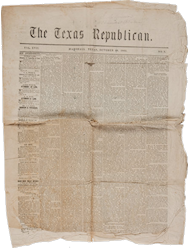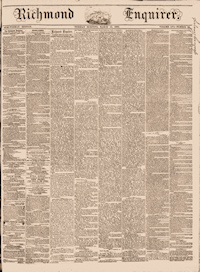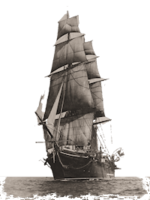April 4, 1863, Richmond Examiner
MAYOR’S COURT – April 3rd, 1863 – The following named parties were charged with engaging in a riot on Thursday, and encouraging and inciting others to engage in the said riot.
Frank Wallip, Benjamin Slemper, Mary Woodward, Mary Waster, Mary Butler, Sarah Coghil, Martha Burnett, Sally Mitchell, Lawrence Martin, Alexander Jenkins, Morgan Burns, Henry Cook, Alexander H. Murray, John Jones, W. J. Lusk, James Hampton, A. D. Briggs, Thomas Samani, C. Lannegan, Elizabeth Ammons, Lucy Jane Palmeter, John D. Lowry, Margaret Denning, William Farrand, Francis Farrand, John Hopkins, Susan Kelly, Mary Jacobs, Martha Fergusson, Jennett Williams, Mildred Imry, Martha Smith, Francis Brown, Anna Bell, Andrew J. Hawkins, Peter Blake, Sarah Champion, Mary Jackson, huckster.
The case of William Farrand and wife was first taken up.
Mr. John D. Harvay testified that on Thursday he saw three boys go into Farrand’s house shortly after the riot began; two of the boys had a pot of butter each, and the third boy had six or eight pair of women’s shoes. After the riot was over, he and Mr. Isaac Walker, and Officer Perrin went to Farrand’s house and found the shoes but could not locate the butter.
Cross-examined by Crane – There was a riot yesterday. Mrs. Farrand denied that any boys had brought any shoes or butter there, but after the shoes were found she acknowledged the boys had brought the shoes there.
Officer Perrin testified that after Mr. Harvey found the shoes he found two other pairs and a quantity of dry goods under Mrs. Farrand’s bed; this boy, John Hopkins was there and had in his possession a new pair of pants and this hat, which has been identified by Mr. Hicks as a hat that had been taken from him during the riot. [continue reading…]










